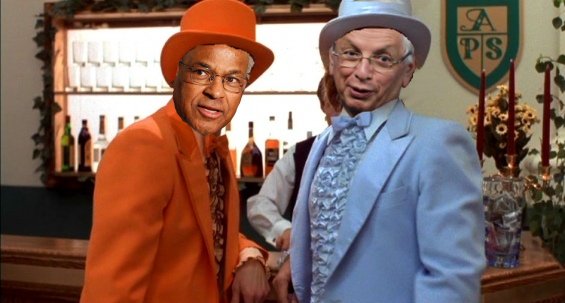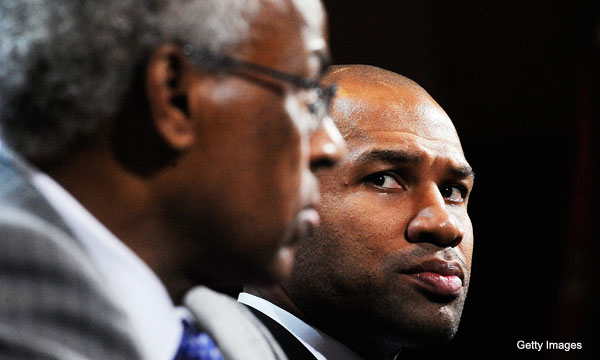 The shuttle diplomacy between lawyers for both sides in the broken mess of contract negotiations between NBA players and owners began on Tuesday, continued Wednesday and will resume today on Black Friday. Yahoo Sports columnist Adrian Wojnarowski broke the story Wednesday afternoon, right about the time most anybody with hope for a season had given up looking for NBA lockout news until after Thanksgiving weekend.
The shuttle diplomacy between lawyers for both sides in the broken mess of contract negotiations between NBA players and owners began on Tuesday, continued Wednesday and will resume today on Black Friday. Yahoo Sports columnist Adrian Wojnarowski broke the story Wednesday afternoon, right about the time most anybody with hope for a season had given up looking for NBA lockout news until after Thanksgiving weekend.
The talks are aimed trying to resolve differences to the point where union lawyers and leadership can get a handshake deal, re-establish the union, draw up a formal proposal, vote on it and open a 66-game season Christmas Day — a televised feast of showdowns that NBA junkies look forward to every year.
The obstacles are many, and go a long way toward explaining why the players disclaimed the union.
- Poor leadership by union chief Billy Hunter and union president Derrick Fisher. They backed down and down again, all the way to a 50-50 split of revenue, and got very little in the way of concessions from the owners.
- Poor bargaining management by Hunter, Fisher and union lawyer Jeffrey Kessler. Of the six items identified as key negotiating points, only the mid-level exception (MLE) restrictions are highly relevant to player movement. Does it matter to the vast majority of players how much the league decides to take from the Lakers and give to the Bucks? Of course not. Yet Fisher and Hunter put it and four other minor issues on their “A-list.”
- 30-40 other proposed contract changes by the owners that are still unbargained. While the union wanted to talk about rarely occurring issues such as sign and trade deals by teams in the luxury tax zone, they agreed to park a host of workplace issues such as drug testing, leaving those for later.

- A lack of good faith bargaining from the owners. Had they wanted to secure an agreement Nov. 14, owners would have agreed to at least one saleable concession that might have given the players reason to approve the deal. Instead, the players saw only smug, insulting press interviews by NBA czar David Stern — who insisted the players vote on a proposal that the union didn’t agree to. No deal.
- Personal conflicts among the key negotiators. Everybody seems to like union prez Fisher but there’s no love lost between Billy Hunter, union lawyer Kessler and commissioner Stern. Stern and Hunter may have staved off retirement to negotiate one more deal, but their omni-presence has been a PR disaster for the league. You’d be hard-pressed these days to find an NBA fan who likes the sight of either of them, especially not fans old enough to remember that Hunter and Stern have been around since the 1980s. Kessler’s the bad guy whom Hunter and Stern can blame for the acrimony before they retire on the heels of one more deal. It won’t be true — but if reports that the two sides are making progress without Kessler in the room are true, the lawyer has served his purpose.
- The double penalty “cliff” proposed by the owners. The Lakers and Celtics and Mavs would lose their full mid-level exception (MLE – set at $5 million, $3 million for penalized teams), and pay a higher tax rate. This reduced exception could be used once every two years. But teams stepping into tax territory for the first time would also be penalized and it would be enforced right away, taking away the full MLE that nudged the team in tax territory. The Memphis Grizzlies or Milwaukee Bucks would be treated like the Celtics or Lakers, albeit paying a different tax rate. Does this benefit competitive balance? It sounds less like something small market owners such as Bucks owner Herb Kohl or Grizzlies (they’d be competitively screwed) owner Michael Heisley wanted and more like a rule that title-contending taxpayers like the Lakers, Spurs, Celtics and Mavs demanded in exchange for agreeing to the double penalty (no – the Heat aren’t paying luxury tax with their roster yet, but this rule will limit what they could pay an MLE free agent). If you’re looking for the one concession that will lead to a contract agreement, the rules on exacting penalties at the edge of the cliff is it.
Clear as oatmeal, right? But make no mistake — one reason that small market owners are out to cut player compensation down to 47 percent of league basketball-related income (BRI) is that most of the other negotiating (if you can call it that) items aren’t very meaningful. Here’s how The New York Times described it:
The parties essentially picked up where they left off Nov. 10, discussing a proposal that includes a 50-50 split of revenue, shorter contracts and tougher spending restrictions. The players rejected that deal, but on the basis of a half-dozen mechanical issues which, in the grander scheme, are fairly minor. They have already conditionally agreed to the 50-50 split and most of the new payroll restrictions.
It should be noted that the owners have made sure not to be too hard on themselves in these negotiations. The 12% cut to the salary cap and luxury threshold won’t go into effect until the 2013-14 season. And behind all of this has been an agreed-upon amnesty clause that would give teams a one-time “get-out-of-our-worst-mistake” card. The player would be released with pay, of course, but his contract would not count against the salary cap number.
Gilbert Arenas (Magic), Baron Davis (Cavs), Mike Miller (Heat) — this means you. For the Bucks that could mean Drew Gooden, whose contract won’t look so tradeable in 2013-14 when the salary cap and luxury threshold would be lowered 12%.
To boot, either side could opt out of the previously proposed ten-year deal after six years when a new TV deal will be in place.
The lawyers have called Derrick Fisher to New York. A deal may finally be in the works.
Happy Thanksgiving.
*******************

 First, a definition of terms.
First, a definition of terms. While all parties involved were busy posturing, it apparently didn’t occur to anyone to bargain on anything else.
While all parties involved were busy posturing, it apparently didn’t occur to anyone to bargain on anything else. *Note: The actual impact of the much-discussed “A-List’ system issues is debatable with the one notable exception discussed above on the MLE vs. luxury tax calculation, which does impact competitive balance and the free agent market. Hunter and Fisher couldn’t win this concession. Under the owners’ proposal small market teams would not be able to improvea without being treated like repeat tax offenders (Lakers, Celtics currently). This is being referred to as a “tax cliff.”
*Note: The actual impact of the much-discussed “A-List’ system issues is debatable with the one notable exception discussed above on the MLE vs. luxury tax calculation, which does impact competitive balance and the free agent market. Hunter and Fisher couldn’t win this concession. Under the owners’ proposal small market teams would not be able to improvea without being treated like repeat tax offenders (Lakers, Celtics currently). This is being referred to as a “tax cliff.”